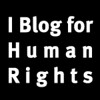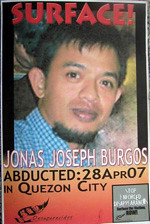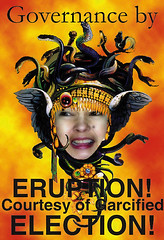Committee Aproval of Nograles Resolution Signals Start of Chacha War: Malacañang no chacha assurance only intended to lull people into complacency
(Press Release from the NATIONAL UNION OF PEOPLES LAWYERS IN THE PHILIPPINES)
With the Committee on Constitutional Amendments' approval of the Nograles Resolution to amend the Constitution, the cha-cha war has been declared.
The National Union of Peoples' Lawyers strongly condemns the sudden approval of Resolution 737 filed by Speaker Prospero Nograles yesterday without the benefit of public hearings to hear those opposed to the proposal. Other than eliminating protectionist provisions in the Constitution, the Nograles Resolution now paves the way for the insertion of amendments that will allow Pres. Gloria Arroyo to run in the 2010 elections. Pronouncements by presidential allies that charter change is dead is nothing more than a scheme to encourage complacency among the people. Malacañang is very confident it will hurdle the four Legal Nodal Points along the path of a successful amendment to the Constitution to extend Pres. Arroyo's reign. The hundreds of millions of taxpayers money that Comelec will spend in the plebiscite this year and the billions that will be spent for the 2010 election that will be paid for by the impoverished Filipino people reeling under the current economic crisis is condemnable especially since it will be spent for the benefit of one person and transnational corporations. NUPL calls on Speaker Nograles to withdraw his chacha resolution as it will only worsen the economic crisis in the country and increase poverty among the people.
Railroading Cha cha
Resolution 737 which will constitutionally allow aliens and 100% foreign owned corporations to buy our lands and exploit our natural resources was only publicly heard last week when resource persons led by Mr. Gerardo Sicat and Alex Magno were invited to express support for Resolution 737. It was approved despite demands that the committee also invite those against opening the country to aliens. The Committee's vote against Resolution 888 urging Congress not to tackle charter change before 2010 shows the single minded intent of pro chacha forces to railroad amendments to the Constitution.
Eliminating constitutional provisions restricting foreign ownership of lands and participation in the exploitation of our natural resources will only lead to foreigners exercising more economic and political control of the country. The price of land will certainly shoot up beyond the reach of ordinary Filipinos once Japanese or other interested foreigners begin buying our land. Under the Art. XII, Sec. 7 of the 1987 Constitution, only Filipinos and Filipino owned corporations can own private lands, utilize our natural resources and operate public utilities. Resolution 737 grants aliens the right to own lands in the Philippines—virtually creating a situation where foreigners own vast tracts of land while millions of Filipinos remain landless. It also allows them decisive control over our economy by allowing them to exploit our natural resources. While Congress refuses to pass a genuine land reform law granting Filipinos a land to till, it readily supports efforts to give land to foreigners. Speaker Nograles and his co-authors are urged to immediately withdraw Resolution 737 as this would only increase poverty in the country.
The rush to approve Resolution 737 becomes more questionable since even Mr. Gerardo Sicat testified that due to the international economic crisis, benefits from further opening up the country to foreign investments will not happen in the near future. The sudden approval only confirms NUPL's belief that another important but hidden agenda geared towards the elimination of the constitutional provision prohibiting Pres. Arroyo from running in the 2010 elections is being readied before election fever sets in.
Pres. Arroyo is obsessed by the possibility that she will lose her immunity by July 1, 2010 and many criminal cases will be filed against her after her term. Considering the strong evidence against her and the difficulty of covering up her crimes once she is no longer president, President Arroyo is surely afraid that she will be the second president convicted for corruption, electoral fraud or human rights violation. There is therefore no recourse for Pres. Arroyo but to simply have the sentence "The President shall not be eligible for any reelection" in Section 4, Article VII of the Constitution deleted. This will entitle her to run in 2010 armed more resources and power than she had in 2004.
Allowing Pres. Arroyo to run for reelection: Hurdling the Four Legal Nodal Points
Resolution 737 will now be tackled in the plenary and therefore subject to amendments by just a mere majority vote and the insertion of a provision allowing Pres. Arroyo to run for reelection. This was admitted by Rep. Victor Ortega himself, the chairman of the Committee that rushed the approval of Resolution 737 during a committee meeting when he was asked if Resolution 737 may be amended in the plenary:
A majority vote of the Committee Members may amend the Resolution in the Committee level and in the same manner, a majority vote of all House Members may amend the Resolution in the plenary (Chairman Victor Ortega, Minutes of the 19th Meeting of the Committee on Constitutional Amendments, December 9, 2008).
Assurances that Congress as a Constituent Assembly will not insert term extensions is without any value not only because of the lack of credibility by members of Congress but also because the Constituent Assembly cannot indeed be bound by assurances from Congress much less from individual congressmen. It is a powerful body distinct from Congress tasked, not to amend laws, but to propose amendments to the Constitution.
Pres. Arroyo is confident that she will get a favorable decision in the four legal nodal points along the road to constitutional change namely the Congress, the Comelec, the Supreme Court and the plebiscite. Should Congress, with the presence of one or two senators, vote "jointly" and approve the charter change resolution by ¾ vote it can then order the Comelec to schedule a plebiscite immediately "after 60 days from such approval" as provided under Section 4, Article XVII of the Constitution. Malacanang is also confident that the Supreme Court will favor charter change and order the Comelec to push through with the plebiscite should anyone hale the Comelec to the Supreme Court. Because there have been no substantial electoral reforms and pro cha cha forces have all the resources and power at their disposal, it is highly likely that the amendment will be approved despite strong opposition.
The NUPL asserts that any proposal to amend the Constitution must be by both Houses of Congress voting separately, even if the Constitution which states under Article XVII (1) that any amendments or revision to the Constitution "may be proposed by The Congress, upon a vote of three-fourths of all its Members", did not expressly provide for separate voting.
The term "Congress" has always been taken to refer to both the House and the Senate voting separately because Congress is bicameral in nature, according to the Constitution itself. A similar provision for example is found in Article VII, Section 19 which also states that the President "shall have the power to grant amnesty with the concurrence of a majority of all the members of the Congress". This provision did not also specify whether voting is joint or separate. The practice of the Congress, however, in all amnesty proclamations including that promulgated by Pres. Arroyo has always been that concurrence by both Houses voting separately. Congress cannot now claim that because the Constitution is silent it is presumed to ordain joint voting of both Houses when it has previously interpreted an exactly similar provision on amnesty as separate voting.
The belated misinterpretation by presidential allies in Congress only exposes their plan to boldly and swiftly push charter change and run over any opposition. The NUPL warns that this "transactional" interpretation of the Constitution will merit the strongest response from the people who will not allow the extension of Pres. Arroyo's reign.
The chacha war has began and the people must use all its power to ensure that the second longest reigning President after Marcos, will not be allowed to amend the Constitution to perpetuate herself in power and further expand alien control over the country.
By calling yourselves the 'people's lawyer,' you have made a remarkable choice. You decided not to remain in the sidelines. Where human rights are assaulted, you have chosen to sacrifice the comfort of the fence for the dangers of the battlefield. But only those who choose to fight on the battlefield live beyond irrelevance." Supreme Court Chief Justice Reynato S. Puno, in his message to the NUPL Founding Congress,Sept. 15, 2007
*******************************************************************************With the Committee on Constitutional Amendments' approval of the Nograles Resolution to amend the Constitution, the cha-cha war has been declared.
The National Union of Peoples' Lawyers strongly condemns the sudden approval of Resolution 737 filed by Speaker Prospero Nograles yesterday without the benefit of public hearings to hear those opposed to the proposal. Other than eliminating protectionist provisions in the Constitution, the Nograles Resolution now paves the way for the insertion of amendments that will allow Pres. Gloria Arroyo to run in the 2010 elections. Pronouncements by presidential allies that charter change is dead is nothing more than a scheme to encourage complacency among the people. Malacañang is very confident it will hurdle the four Legal Nodal Points along the path of a successful amendment to the Constitution to extend Pres. Arroyo's reign. The hundreds of millions of taxpayers money that Comelec will spend in the plebiscite this year and the billions that will be spent for the 2010 election that will be paid for by the impoverished Filipino people reeling under the current economic crisis is condemnable especially since it will be spent for the benefit of one person and transnational corporations. NUPL calls on Speaker Nograles to withdraw his chacha resolution as it will only worsen the economic crisis in the country and increase poverty among the people.
Railroading Cha cha
Resolution 737 which will constitutionally allow aliens and 100% foreign owned corporations to buy our lands and exploit our natural resources was only publicly heard last week when resource persons led by Mr. Gerardo Sicat and Alex Magno were invited to express support for Resolution 737. It was approved despite demands that the committee also invite those against opening the country to aliens. The Committee's vote against Resolution 888 urging Congress not to tackle charter change before 2010 shows the single minded intent of pro chacha forces to railroad amendments to the Constitution.
Eliminating constitutional provisions restricting foreign ownership of lands and participation in the exploitation of our natural resources will only lead to foreigners exercising more economic and political control of the country. The price of land will certainly shoot up beyond the reach of ordinary Filipinos once Japanese or other interested foreigners begin buying our land. Under the Art. XII, Sec. 7 of the 1987 Constitution, only Filipinos and Filipino owned corporations can own private lands, utilize our natural resources and operate public utilities. Resolution 737 grants aliens the right to own lands in the Philippines—virtually creating a situation where foreigners own vast tracts of land while millions of Filipinos remain landless. It also allows them decisive control over our economy by allowing them to exploit our natural resources. While Congress refuses to pass a genuine land reform law granting Filipinos a land to till, it readily supports efforts to give land to foreigners. Speaker Nograles and his co-authors are urged to immediately withdraw Resolution 737 as this would only increase poverty in the country.
The rush to approve Resolution 737 becomes more questionable since even Mr. Gerardo Sicat testified that due to the international economic crisis, benefits from further opening up the country to foreign investments will not happen in the near future. The sudden approval only confirms NUPL's belief that another important but hidden agenda geared towards the elimination of the constitutional provision prohibiting Pres. Arroyo from running in the 2010 elections is being readied before election fever sets in.
Pres. Arroyo is obsessed by the possibility that she will lose her immunity by July 1, 2010 and many criminal cases will be filed against her after her term. Considering the strong evidence against her and the difficulty of covering up her crimes once she is no longer president, President Arroyo is surely afraid that she will be the second president convicted for corruption, electoral fraud or human rights violation. There is therefore no recourse for Pres. Arroyo but to simply have the sentence "The President shall not be eligible for any reelection" in Section 4, Article VII of the Constitution deleted. This will entitle her to run in 2010 armed more resources and power than she had in 2004.
Allowing Pres. Arroyo to run for reelection: Hurdling the Four Legal Nodal Points
Resolution 737 will now be tackled in the plenary and therefore subject to amendments by just a mere majority vote and the insertion of a provision allowing Pres. Arroyo to run for reelection. This was admitted by Rep. Victor Ortega himself, the chairman of the Committee that rushed the approval of Resolution 737 during a committee meeting when he was asked if Resolution 737 may be amended in the plenary:
A majority vote of the Committee Members may amend the Resolution in the Committee level and in the same manner, a majority vote of all House Members may amend the Resolution in the plenary (Chairman Victor Ortega, Minutes of the 19th Meeting of the Committee on Constitutional Amendments, December 9, 2008).
Assurances that Congress as a Constituent Assembly will not insert term extensions is without any value not only because of the lack of credibility by members of Congress but also because the Constituent Assembly cannot indeed be bound by assurances from Congress much less from individual congressmen. It is a powerful body distinct from Congress tasked, not to amend laws, but to propose amendments to the Constitution.
Pres. Arroyo is confident that she will get a favorable decision in the four legal nodal points along the road to constitutional change namely the Congress, the Comelec, the Supreme Court and the plebiscite. Should Congress, with the presence of one or two senators, vote "jointly" and approve the charter change resolution by ¾ vote it can then order the Comelec to schedule a plebiscite immediately "after 60 days from such approval" as provided under Section 4, Article XVII of the Constitution. Malacanang is also confident that the Supreme Court will favor charter change and order the Comelec to push through with the plebiscite should anyone hale the Comelec to the Supreme Court. Because there have been no substantial electoral reforms and pro cha cha forces have all the resources and power at their disposal, it is highly likely that the amendment will be approved despite strong opposition.
The NUPL asserts that any proposal to amend the Constitution must be by both Houses of Congress voting separately, even if the Constitution which states under Article XVII (1) that any amendments or revision to the Constitution "may be proposed by The Congress, upon a vote of three-fourths of all its Members", did not expressly provide for separate voting.
The term "Congress" has always been taken to refer to both the House and the Senate voting separately because Congress is bicameral in nature, according to the Constitution itself. A similar provision for example is found in Article VII, Section 19 which also states that the President "shall have the power to grant amnesty with the concurrence of a majority of all the members of the Congress". This provision did not also specify whether voting is joint or separate. The practice of the Congress, however, in all amnesty proclamations including that promulgated by Pres. Arroyo has always been that concurrence by both Houses voting separately. Congress cannot now claim that because the Constitution is silent it is presumed to ordain joint voting of both Houses when it has previously interpreted an exactly similar provision on amnesty as separate voting.
The belated misinterpretation by presidential allies in Congress only exposes their plan to boldly and swiftly push charter change and run over any opposition. The NUPL warns that this "transactional" interpretation of the Constitution will merit the strongest response from the people who will not allow the extension of Pres. Arroyo's reign.
The chacha war has began and the people must use all its power to ensure that the second longest reigning President after Marcos, will not be allowed to amend the Constitution to perpetuate herself in power and further expand alien control over the country.
By calling yourselves the 'people's lawyer,' you have made a remarkable choice. You decided not to remain in the sidelines. Where human rights are assaulted, you have chosen to sacrifice the comfort of the fence for the dangers of the battlefield. But only those who choose to fight on the battlefield live beyond irrelevance." Supreme Court Chief Justice Reynato S. Puno, in his message to the NUPL Founding Congress,Sept. 15, 2007
 Cheryl Chyt Daytec, is a Practising/Litigation Lawyer, Human rights advocate, Poet, Writer, and an Associate Professor at St. Louis University in Baguio City, Philippines. She is presently a member of the Board of Trustee of Cordillera Indigenous Peoples' Legal Center (DINTEG) rendering pro-bono services for the poor and the oppressed (marginalized women and children, informal settlers, IPs, laborers, HR victims, etc.).
Cheryl Chyt Daytec, is a Practising/Litigation Lawyer, Human rights advocate, Poet, Writer, and an Associate Professor at St. Louis University in Baguio City, Philippines. She is presently a member of the Board of Trustee of Cordillera Indigenous Peoples' Legal Center (DINTEG) rendering pro-bono services for the poor and the oppressed (marginalized women and children, informal settlers, IPs, laborers, HR victims, etc.). 
POGB will not sell, exchange, use or allow any 3rd party access to your email for
any other purposes without exception, email exclusively for article updates only.
























0 Speak Out:
Post a Comment